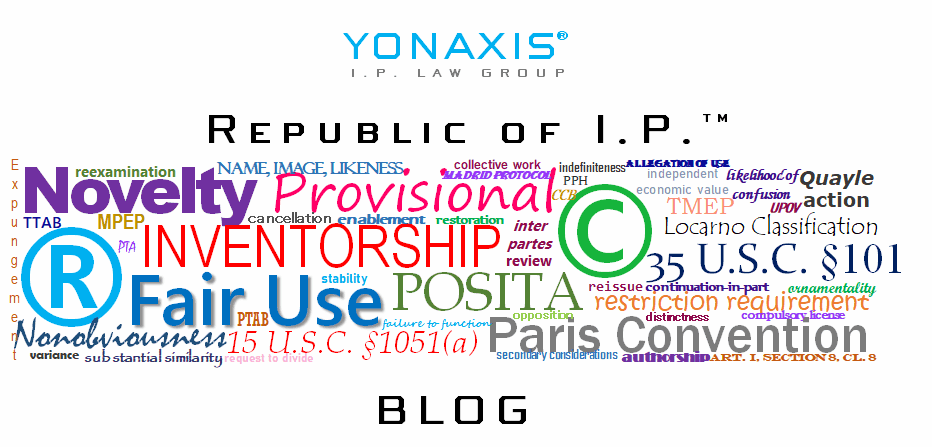Another patent-eligibility case has made its rounds through the appeals process, as the Court of Appeals for the Federal Circuit, in an opinion dated November 16, 2018, in Ancora Techs., Inc. v. HTC America, Inc.,[1] held that computer security improvement claim is patent-eligible under 35 U.S.C. §101. Ancora owns U.S. Patent No. 6,411,941 (‘941) directed …
Category: fed circuit watch
opinions by ct appeals for federal circuit (patent, trademark, some copyright)
Fed Circuit Watch: Primer and Diagnostic Method Claims Not Patent-Eligible
This is the second §101 case decided by the Court of Appeals for the Federal Circuit on October 9, 2018, Roche Molecular Systs., Inc. v. Cepheid.[1] This case is not so remarkable because it held patent claims as ineligible subject matter, but because there appears to be disjointed appellate §101 analysis applied between this case …
Fed Circuit Watch: Electronic Tab Patents Found Patent-Eligible
In the first of two cases analyzing patent subject matter-eligibility under 35 U.S.C. §101 decided by the Court of Appeals for the Federal Circuit, Data Engine Techs. LLC v. Google LLC,[1] issued on October 9, 2018, a circuit panel held certain patent claims directed to electronic worksheet tabs as patent-eligible. Several other claims were found …
Fed Circuit Watch: Patent Prosecution 101 – Don’t Mess with Your Priority!
A recent case decided by the Court of Appeals for the Federal Circuit, Natural Alternatives Int’l, Inc. v. Iancu,[1] on October 1, 2018, highlights one of the pitfalls of patent prosecution that is sometimes overlooked or left to non-practitioner patent staff to handle but carries a major risk of losing patent term or patent priority. …
Fed Circuit Watch: PTAB Messed Up Obviousness Analysis (Again)
The Patent Trial and Appeal Board (PTAB) seems to have bungled an obviousness analysis (again), and was dinged by the Court of Appeals for the Federal Circuit in E.I. DuPont de Nemours v. Synvina C.V.,[1] decided on September 17, 2018. The case is a good primer on the law of obviousness related to overlapping ranges. …
Fed Circuit Watch: PTAB Bungles Real Party-in-Interest Analysis
On September 7, 2018, the Court of Appeals for the Federal Circuit decided Worlds Inc. v. Bungie, Inc.,[1] representing another case in the growing case law of IPRs and specifically, the time-bar application and collateral estoppel. Worlds Inc. owns U.S. Patent Nos. 7,945,856 (‘856), 8,082,501 (‘501), and 8,145,998 (‘998). All are directed to methods and …
Fed Circuit Watch: Different Evidence + Different Standards of Review = Different Validity Result
The Court of Appeals for the Federal Circuit presented an interesting paradox in patent validity challenges, especially when the same parties bring forth essentially the same issues, but have different results in different federal agency or judicial reviews, as was seen in Nobel Biocare Services AG v. Instradent USA, Inc.,[1] decided on September 13, 2018. …
Fed Circuit Watch: Opioid Addiction Drug Patent Not Obvious
On September 10, 2018, the Court of Appeals for the Federal Circuit decided Orexo AB v. Actavis Elizabeth LLC,[1] in what turns out to be a fairly straightforward analysis of an obviousness case under 35 U.S.C. §103. The facts are as follows. Orexo owns U.S. Patent No. 8,940,330 (‘330), which describes opioid treatment generally, and …
Fed Circuit Watch: Broad Wins Latest CRISPR Court Battle
On September 10, 2018, the Court of Appeals for the Federal Circuit decided Regents of the Univ. of Calif. v. Broad Inst., Inc.,[1] in the latest court battle in the CRISPR patent challenge pitting three of the nation’s largest research universities against each other. CRISPR, or “Clustered Regularly Interspaced Short Palindromic Repeats,” is a family …
Fed Circuit Watch: Nexus Required Between Attorney Fees Award and Misconduct
Another recently unsealed opinion from August 15, 2018 revealed a decision of the Court of Appeals for the Federal Circuit involving inequitable conduct and fee award. In the opinion dated July 28, 2018, in In re Rembrandt Techs., LP Patent Litigation,[1] the Fed Circuit held that while the district court did not abuse its discretion, …
